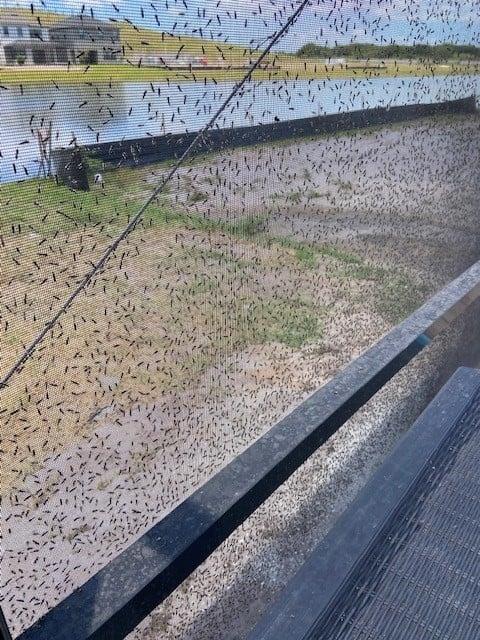If you’ve been in Florida for any length of time and live around any body of water, you’ve experienced midges, or commonly referred to as “Blind Mosquitos”. Midges are small, dainty flies with one pair of long, narrow wings, and long, skinny legs. They are usually found around lakes and ponds. They can reproduce in vast quantities and that’s when they become a big issue for communities. Although they are called “Blind Mosquitos”, the big difference between them and the mosquito is that midges do not bite humans. It’s common to see midges in big swarms or “clouds” in the air, often around dusk and they thrive in the warm, moist climate year-round in Florida.
Part of what makes midges so difficult to control is their ongoing lifecycle that starts in ponds, lakes and stormwater systems and ends on land. They lay their eggs on a waterbody’s surface before sinking into the muck. When the eggs hatch, they either borrow further into the sediment or swim freely through the water. This process takes as little as two or three weeks. That means that you are fighting a losing battle because while you’re trying to control the adult ones, you still have plenty of eggs and larvae ready to continue the cycle.
So, how do you control them then? Bug sprays won’t keep the midge flies away. Pesticides alone won’t solve the problem long-term. Professionals recommend the following:
1. Surveillance where samples are taken to identify and estimate their population levels;
2. Nutrient Abatement by ensuring your water is in constant motion with aeration systems, shoreline planting to absorb nutrient run-offs (such as landscape fertilizer run-offs), and algae control to improve overall water quality;
3. Biological control by adding certain fish, which feed on midges. Just make sure that the fish species and the amount is estimated by someone with experience. Adding the wrong fish, the wrong quantity, or adding into the wrong waterbody can have adverse effects;
4. Chemical control is done mainly to reduce annoyance and may include larvicides applied to waterbodies, ULV adulticide, barrier treatments applied to siding and foliage, or more.
For more information on midges, contact your professional aquatic services vendor.
